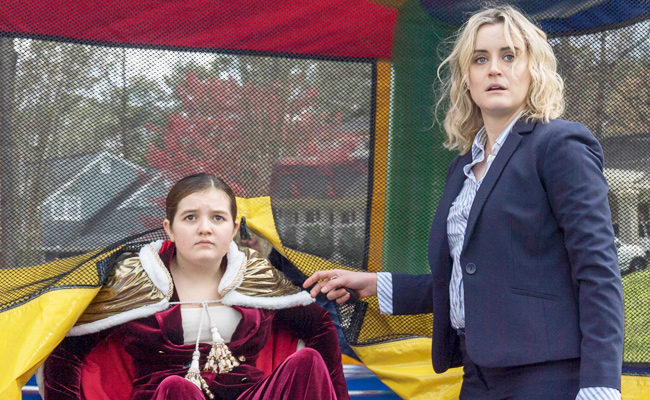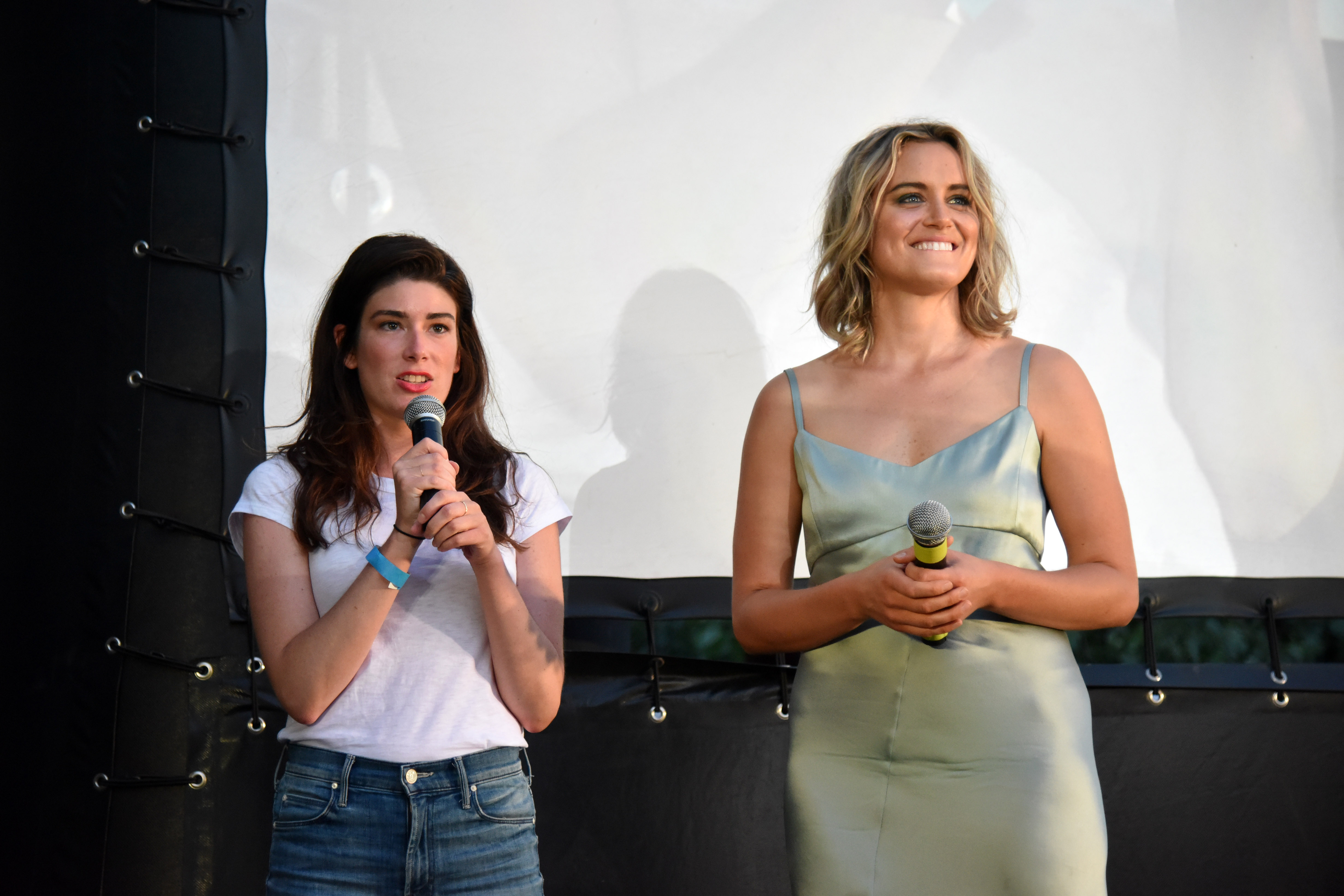
When I sat down to watch Family I wasn’t expecting much. I knew that it was an indie comedy with a Juggalo angle, and I couldn’t imagine that a nice little dramedy starring the blonde lady from Orange is the New Black (Taylor Schilling) could possibly do right by one of America’s oddest subcultures. There are many ways to do a bad Juggalo take.
I figured it’d be either a skin-deep depiction at best or wildly misguided one at worst, Juggalos played either for cheap laughs or for cheap feels — butt of the joke or easy redemption story. This to say nothing of the natural logistical challenges. The kind of people who become Juggalos (that’s fans of horrorcore rap group Insane Clown Posse, for those not in the know, though it goes much deeper than that), almost by definition, are not the kind of people who act in indie films. The groups are diametrically opposed. One defined by their proximity to and participation in the coastal cultural production complex, the other by their complete separation from it.
Juggalos are also just difficult to understand in general. I barely understood them myself before we went to the Gathering of the Juggalos (Juggalo Burning Man, basically) to shoot a documentary in 2013 (Whoop Dreams). Not that I’d call myself an expert now, despite all I’ve learned.
To my surprise, Family writer/director Laura Steinel does an incredible job capturing who Juggalos really are. Which, just as impressively, she manages to incorporate into an otherwise accessible family comedy about a 13-year-old girl who doesn’t fit in. Taylor Schilling plays Kate, your classic bitchy career woman who works at a hedge fund and has little time for social graces. She ends up having to babysit Maddie (Bryn Vale), her 13-year-old niece who’s sick of trying to fit in. Schilling and Vale do consistently comic, nuanced work in roles that could’ve easily been dull sitcom tropes.
“I grew up in New Jersey, and I’m kind of fascinated by countercultures and the kids that hang out outside of 7-Eleven, because that was me,” Steinel told me in an interview this week. “I would say I grew up with a few closet Juggalos.” She adds, “I had just written Family when I saw this documentary about Juggalos. I did a second pass to incorporate the Juggalo aspect because it felt like, what’s the scariest thing your 13-year-old girl can go want to do? Become a Juggalo felt like that was at the top of that list.”
The natural contradiction of Juggalos is that they can be sweet and accepting and nice almost to a person, and still a little terrifying. When I attended the Gathering, I’m fairly certain I would enjoy hanging out with the people I met there more than I would people at Burning Man, and they were all extremely nice to us. We also filmed a guy who let strippers bite off his nipples. So yes, doing justice to that is a challenge.
“Look, I think that it’s very easy in our world today to feel like an outcast or to feel cast aside. When you don’t have enough money to go to therapy you find other outlets to express yourself,” Steinel says. “I think that ICP is a very therapeutic avenue for a lot of people. It’s a very therapeutic release for a lot of people that may not have the words to express how they feel or have the money to pay for a therapist to talk to somebody, or whatever. I just see it as it’s warpaint in a way. I appreciate that aspect of it.”
Even knowing who Juggalos are, there’s still the much greater challenge of being able to accurately recreate them. In the film, Maddie, the 13-year-old Taylor Schilling’s character has to babysit, doesn’t start the film as a Juggalo. She sort of gets inducted into the Juggalo fam-ternity by a guy she meets at the 7/11, whose name is Daniel but who goes by “Baby Joker,” played Fabrizio Guido. Guido doesn’t especially look the part (probably for reasons outlined above), but he manages to exude an ineffable Juggalosity that makes it work — call it Big Juggalo Energy.
“Baby Joker auditioned for me in Los Angeles,” Steinel says. “There wasn’t a ton of time to do anything, let alone audition people, but he immediately had this sort of sweetness to him. At the same time, I bought him as a counterculture-embracing Juggalo teenager. He just kind of reminded me of kids I grew up with in New Jersey. On top of that, he’s mega talented.”

Even with tone and accurate casting out of the way, there was still the matter of texture. Steinel had to shoot not just one Juggalo, but a big group of them, which presented an even greater filmmaking challenge.
“We shot a mini-Gathering in Atlanta during the shoot,” Steinel explains. “We did not have a lot of extras for that, but I knew I was going to shoot it really tight, meaning that all the frames would just be of the person who’s talking, like Taylor. But I knew I would have to go to the actual Gathering…I went by myself with just my DP, Sam Kretschmar, and Tyler Bastianson. We just went ourselves to get footage. The financiers weren’t big fans of me going.”
“So I said, ‘I’ll just pay for it, and then you’ll buy it off of me. I’m sure you’re going to love the footage,'” Steinel explained. “I wore Taylor’s wig and her costume, so we just shot me from behind. Then, I thank God in the edit it worked, because it could’ve gone drastically wrong, but it worked out. You can’t do a movie including Juggalos and not go to the Gathering.”
I asked Steinel if she witnessed anything crazy, the image of the nipple-less Juggalo still permanently imprinted in my skull.
“There’s the whole gamut of it,” she says. “I think personally the scariest part was that I had to go on stage in Taylor’s costume and get them to boo me and stuff for the movie. They were super helpful, until they weren’t. I think I had about a good 45 seconds of them contributing to what I asked for and then things started flying at my face. I was just worried about the camera, so I was like, ‘We’ve got to get out of here before that camera gets hit with something and we can’t repair it.’ Yeah. That was my highest moment, I’d say. Oh, and I saw a baby. Like, a newborn baby.”
And even after all of that, getting Family into theaters was a three-year process (not counting pre-production) for Steinel, and when it finally hit, it was programmed against Avengers: Endgame — the actual biggest movie of all time.
“I’m just hoping for spillover,” Steinel jokes, “for the people that can’t get in that are like, ‘Oh, what do we do? All right. We’ll see this, I guess.'”
It’s hard to say how much hope there is of that happening, but the long timeline — which is hardly unique to independent filmmaking — did have some benefits. As you watch Family, it feels like a small-budget indie, which it is, but there are people in it who are now reasonably well-known who keep popping up. Kate McKinnon as the neighbor. Brian Tyree Henry (a future Oscar winner if I’ve ever seen one) as Maddie’s karate instructor. Matt Walsh as a coworker.
“Brian Tyree Henry had not been in 35 films when we cast him in ours,” Steinel says.
In addition to Henry, there’s also an uncredited cameo by pre-Russian Doll Natasha Lyonne, completely obscured by Juggalo face paint, unrecognizable but for her Borscht Belt rasp.
“[Natasha] knew Taylor from Orange [is the New Black]. We were all just sitting around. I was like, ‘I want to write a part for a Juggalo.’ She’s like, ‘Natasha will do it.’ We just called her and she was like, ‘Yeah, I’ll be there tomorrow.’ She just came down,” Steinel says.
—
I won’t tell you that Family is the best movie of the year. But it’s cute, and it’s sweet, and it features great, nuanced comedic performances by Taylor Schilling, Bryn Vale, Fabrizio Guido, and the rest of the “always goods” in the supporting cast. At 83 minutes, it’s perfect Endgame counter-programming, and it’s the only movie officially endorsed by ICP and Psychopathic Records. Would your buddies Violent J and Shaggy 2 Dope ever steer you wrong?
Vince Mancini is on Twitter. You can access his archive of reviews here.






